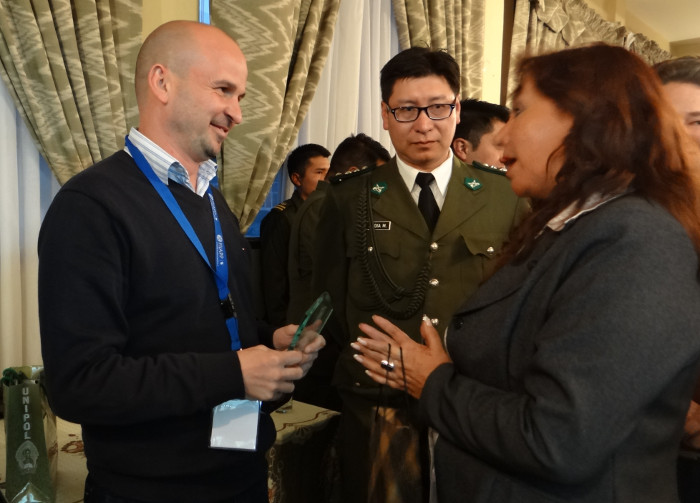-
27 October 2017
Category : Interview
FIIAPP expatriates: Santiago Santos Benitez
“The city of La Paz is about 3,600 metres above sea level, which is an initial handicap for the adaptation process.”
 Santiago Santos during one of the project’s activities in Bolivia
Santiago Santos during one of the project’s activities in BoliviaWe turn our attention to fieldwork and look at Bolivia through the eyes of Santiago Santos Benitez, the technical coordinator of the project European support for the special counter-narcotics police force in Bolivia in application of the law.
How have you adapted to this country?
Well, I’ve really been working in Bolivia for 15 years. I spent two years in the north of the country, in Riberalta, Department of Beni. I knew Bolivia quite well and I’d been to La Paz several times.
The city of La Paz is about 3,600 metres above sea level, which is an initial handicap for the adaptation process. Whether or not you have already lived in this city, you have to acclimatise every time you return. As to other issues, it should be noted that Bolivians are very polite, friendly people, so adapting to Bolivian society is very easy. The culture, their ways of working, in fact we have lots of similarities that make the process easier.
La Paz is a city in the Chuquiago Marka valley so it is “protected” by mountain chains. This squeezes the city somewhat and limits its growth. This factor has made its urban growth very disorganised, creating a city set in the midst of chaos. When you walk around La Paz, you find myriads of streets and historical buildings alongside tall skyscrapers. At the beginning it can seem somewhat stifling; however, over time the chaos becomes this city’s special attraction.
What was most difficult for you and what was least difficult?
Personally, and this is not always true for everyone, it was adapting to the altitude that was the greatest handicap for me. La Paz is surrounded by high mountains and is constantly split up by steeply sloping streets, which in the beginning can be somewhat discouraging.
The easiest thing, let’s say, is adapting to the country itself because there are many similarities between our Spanish culture and Bolivian culture. Speaking the same language also makes adaptation much easier.
Is this your first experience outside of Spain?
I’ve been working outside of Spain for almost 15 years. My first posting was to Bolivia in 2003. I’ve worked mainly in East Africa in countries like Ethiopia, Somalia, Mozambique, Kenya and Tanzania. I’ve also worked in Asia, in India and Nepal.
What is your work like and your daily routine?
We try right from the first moment to link up with social institutions in the daily routine of the project. We work at the offices of our local Bolivian partner, the Secretariat for Coordination of CONALTID (National Drug Control Council) and we have a relationship of collaborating on and coordinating all the activities that we carry out as part of this project. We also work with many other Bolivian institutions, both public and private. Although we do most of our work in the office, which increases coordination with our local partner, we are constantly travelling to other departments since the project is a national one. As well as carrying out the duties of my position as Technical Coordinator, I also coordinate courses on combating people smuggling and trafficking. This means that I have to actively take part in these courses, many of which are held in other cities away from La Paz.
What is your relationship with headquarters in Madrid?
This is a fundamental aspect of the smooth running of the project. There is direct daily communication with Sergio Garrido, who is the person who handles all the economic management of the project from Madrid. Although we have a time difference of 6 hours between Madrid and La Paz we maintain very smooth, daily communication, which is very necessary for the smooth running of the activities. But we do not only work in coordination with Sergio, we also have the support of Mariano Guillén, Director of the Security and Justice Department, who gives us constant support. Another key department for cooperative relations between Bolivia and Spain is Communications. Through our colleagues, we publicise our activities in Spain, which plays a vital role not only in showing what is really happening in Bolivia and our link with the country through the project but also in public accountability.
What about your colleagues in Bolivia?
Teamwork and coordination are a cornerstone of keeping the project running smoothly. The team is made up of 6 people. There are three Spaniards and one French colleague. We also have the support of two Bolivian colleagues who have administrative and logistical duties and help us all the time with all the paperwork for bringing in foreign experts for the training courses that we carry out.
How would you evaluate your experience of working as an FIIAPP expatriate in Bolivia?
The FIIAPP is an institution with great experience in this type of project, which means working with highly specialised people. It is also an extremely professional organisation, which makes the work very much easier.
Do you have any experiences or anecdotes about your arrival in the country?
At the beginning, there were three public institutions participating in the project; however, little by little the number of institutions has increased. At the moment, we are working with about 20 institutions, including civil society. This is a real handicap when coordinating activities, courses and other things planned as part of the project. In my case, and it can be said that I have worked on dozens of projects, this is the first time that I found myself in the situation of dealing with such a wide range of institutions.
The views and opinions expressed in this blog are the sole responsibility of the person who write them.




